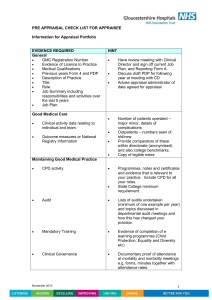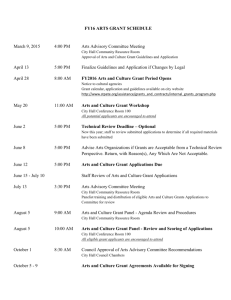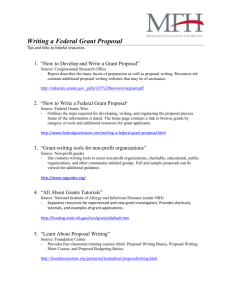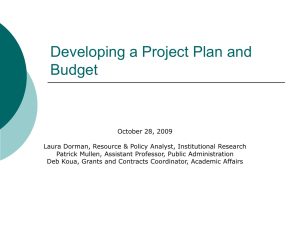The Staff Development Policy
advertisement
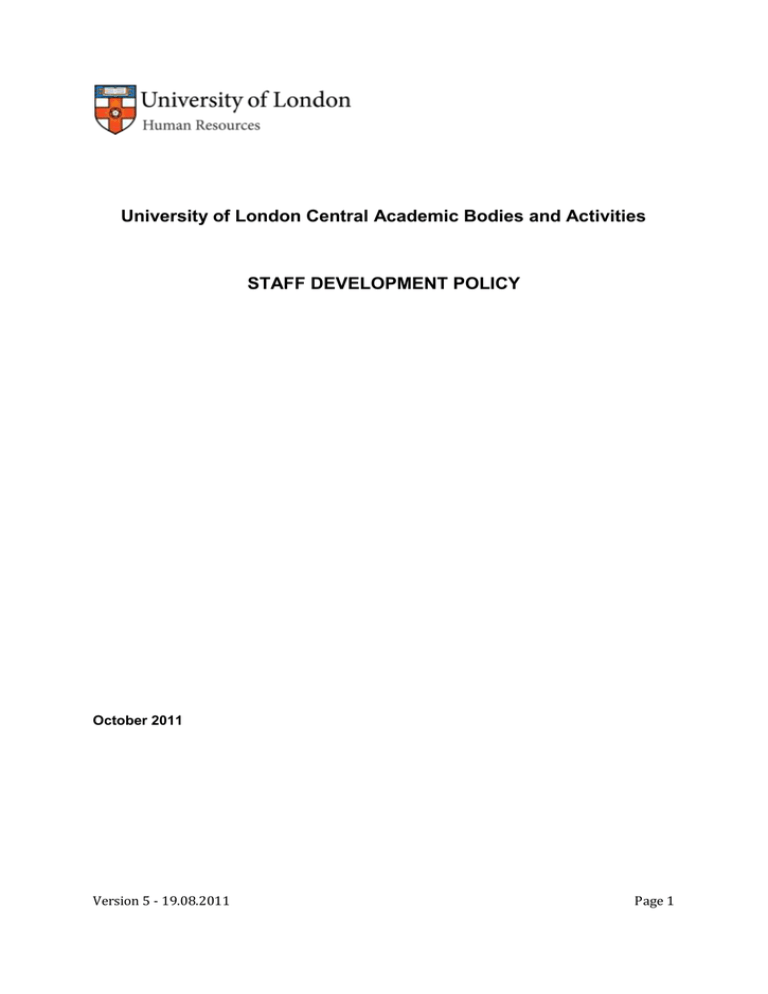
University of London Central Academic Bodies and Activities STAFF DEVELOPMENT POLICY October 2011 Version 5 - 19.08.2011 Page 1 1.0 Background The University’s Strategic Plan 2009-2014 had the following five Aims: Aim 1: To maintain and enhance the academic excellence of the federal University Aim 2: To deliver highly effective services to Colleges, offering excellent value for money Aim 3: To ensure the financial sustainability of all University operations Aim 4: To fulfil the regional, national and international roles of the University Aim 5: Create and retain a workforce with the necessary ethos, working practices and competences to deliver the University’s Strategic Plan In order to achieve Aim 5, one of the University’s Objectives is “continue to provide excellent training and development in order to improve the effectiveness of University staff”. 1.1 The University will ensure all individuals will be given opportunities to advance their learning including access to both training and development to enable them to perform effectively in their jobs and to develop and progress according to their abilities. 1.2 Staff development includes all forms of development activity including personal study, e-learning, presenting conference papers, sabbaticals, research and publication, cross-institutional or external working groups, process review/improvement teams, peer observation, scholarship, exhibitions, consultancy, internal/external courses, workshops, seminars, away-days, work shadowing, coaching, mentoring, secondments, leadership/management development, planned experience, networks, membership of professional bodies. 1.3 All staff development activities will be conducted in accordance with the University’s Equal Opportunities Policy. 1.4 The University is subject to a number of statutory requirements and it must ensure that staff are trained to perform legally, in the best interests of themselves, others and the University. Certain staff development activities are therefore mandatory. 1.5 Individual staff have a responsibility for keeping themselves informed about developments in their own field or area of work, and the University encourages staff to be active in their pursuit of professional development. 1.6 Staff should give thought to their own training and development needs and career aspirations and be prepared to invest time and energy in realising these. 2.0 Senior Managers 2.1 Senior managers should agree with managers the allocation of resources and will take into account staff numbers, perceived needs and contingencies. 2.2 Senior managers should support and guide managers in their decision-making re: allocation of resources at individual / team level; appropriate choices for staff development; and evaluating the effectiveness of staff development in their team. Version 5 - 19.08.2011 Page 2 2.3 Senior managers will also ensure that managers can perform effectively by allowing time for them to carry out their staff development duties and by ensuring support and guidance for appropriate management development. 3.0 Managers’ Responsibility 3.1 All staff involved in the appraisal and development of others must undertake appropriate training for this role, provided by the Staff Development Unit. 3.2 From May 2010 onwards the University is introducing a performance management framework and competency model for all staff. There will be commercial and customer service competencies included in the standard list. All Job Descriptions will be updated with competencies and all staff will be appraised against competencies in the 2009/10 appraisal review. Further details about the process and training available are on the SDU website here: http://www.london.ac.uk/123.html. 3.3 Managers must evaluate the effectiveness of staff development at individual and team level against a set of criteria agreed with their senior manager, and plan for next year’s staff development resourcing. 4.0 Individual Responsibility 4.1 All staff should be encouraged to think in terms of continuous professional development. 4.2 Existing competencies must be maintained, knowledge and expertise broadened and deepened and continuous updating must take place if the individual is to continue to perform his or her role effectively as circumstances change. 4.3 Development will vary according to where the individual is employed, their role and the stage of their career, and can range from updating/broadening of knowledge and skills to reflection on experience and preparation for changing roles. 4.4 The individual’s development should be facilitated through regular appraisals and interim discussions, usually with their team leader or line manager, to create and update an individual development plan based upon agreed development objectives, resources available and evaluation. 4.5 Responsibility for obtaining information/guidance on development activity and for sharing any subsequent outcomes that may benefit others is shared between the staff member and their manager. 5.0 Implementation 5.1 A staff development budget will be held by the Manager of the SD Unit on an annual funding basis and advice given to Managers on an appropriate level of staff development (as a rule of thumb, 3-5 days a year may be appropriate). Funding will be used to meet development criteria identified at formal and informal appraisal meetings and will be supportive of the University’s strategic objectives. Version 5 - 19.08.2011 Page 3 5.2 Staff will receive support and guidance by their line manager in conjunction with guidance and advice from Staff Development Unit. 5.3 The SD Unit will publish the training courses and programmes on offer for the University’s staff in a range of areas and subjects. Further events may be added and the programme expanded in response to demand. For example, we will schedule additional courses in response to specific requirements, for a particular team or to be open to all staff. 5.4 When allocating places on the in-house programme, priority will be given to those staff who have identified the particular development need as part of their appraisal and their Personal Development Plan (PDP) has been sent to us. Please note that if a course requested through the PDP is included in our programme we will assume that the staff member will attend the in-house course and we will not offer alternatives unless we are contacted requesting a specific external option. 5.5 All bookings must initially be made through the on-line application form. Applicants should liaise with their manager prior to registering for a course to ensure that operational requirements are taken into account. Confirmation of a place on the course will be sent by the Staff Development Unit about 2 weeks prior to the course. We will however make contact as soon as possible if there is a problem with the booking. Courses usually take place in Senate House, or Stewart House, 32 Russell Square. 5.6 Where no cost is indicated, the courses are free to all central University staff as these are funded either from the central training budget or through HR Strategy funding. Course or exam fees – where listed – will have to be borne by the self-funding departments and institutes themselves (TCGUL, ULCC, ULIA, SHLs, ULU) with staff from the support departments being funded from the central training budget. 5.7 IT training and support to achieve ECDL qualifications is provided in-house at no charge (apart from examination fees which will be met by Departments). 5.8 Mandatory health and safety and other training (eg induction, recruitment and selection) will be provided and funded by the Staff Development Unit. 6.0 Time Off To Train 6.1 The Time off to Train procedure meets legislation introduced under The Apprenticeships, Skills, Children and Learning Act 2009 and Employment Rights Act 1996, which give employees the right to request time off to train or study and to have this request considered in accordance with a statutory procedure. 6.2 This procedure augments the existing staff development provisions offered by the University. It is envisaged that it will be used by staff only in the exceptional circumstance that they are unable to access and use the resources already available to all staff. Version 5 - 19.08.2011 Page 4 6.3 Under this procedure staff are entitled to apply to attend accredited programmes leading to a qualification or unaccredited training to help them develop specific skills relevant to their job or the University. 6.4 There is no absolute right for employees to take time off for training and no requirement for the University to pay employees during the time off or to pay for the training itself. 6.5 Managers may consider meeting such requests from their Department’s budget where deemed appropriate and where funds are available. Alternatively, managers may agree to allow staff members to work flexibly to make up time spent training or may consider a temporary reduction in hours to support unpaid time off to train. 6.6 Full details of the scheme, and how to apply, are available from the SDU. 7.0 Support for Private non-work-related Study 7.1 In assessing individual applications for grants for academic courses, the following guidelines will normally apply. 7.2 The member of staff concerned must be in the permanent employment of the University whatever the source of funding of the post; have completed one calendar year of service at the time of application; and normally have at least one full year to serve before retirement/contract end. 7.3 The member of staff’s line manager and Head of Department will be consulted on the application and whether it is the most appropriate development activity for the applicant at that time. Information will also be sought as to whether there is any reason why a grant should not be made. Grants will not be made to a member of staff who is the subject of a current disciplinary warning or investigation. 7.4 Grants of up to 50% will normally be made for the current year and any further years required to complete the course up to a maximum of four years, subject to continued employment by the University, but not towards fees paid for years of a course completed prior to the application for support. 7.5 Grants will not normally be made to a member of staff who has already received assistance from the Fund for academic courses. 7.6 Applications will normally be considered twice a year (in July and January). Priority will be given to applicants who wish to acquire their first academic qualification whether it be a degree, or equivalent diploma, or certificate. Further and higher degrees will then be considered. 7.7 Study leave is not available for staff in receipt of grants from the Fund. 7.8 Applications must be in writing (to the Director of HR, Ground Floor, Senate House) setting out clearly the nature of the course, where it is to be taken, the duration, the fees Version 5 - 19.08.2011 Page 5 payable, the extent to which the member of staff is liable for fees, and details of any other sources from which financial support has been sought or obtained. See https://intranet.london.ac.uk/2232.html. Once approved, the member of staff should enrol upon the course and obtain a receipt. These should be forwarded to the Staff Development Manager as soon as they are received. Grants for subsequent years of a course will not be made if this information is outstanding from a previous year. 8.0 Fee Remission for UoLIA Programmes 8.1 If a permanent member of staff, with more than one year’s service, wishes to enrol on a University of London International Programme, they will usually receive a remission of 80% of the standard fees payable to the University. 8.2 We offer this opportunity because, beyond the value of the personal development, we think it is important that as many of our staff as possible in every part of the organisation have first-hand experience of what it means and how it feels to be a student of the University of London. 8.3 The University is committed to helping as many staff as possible to gain academic qualifications in this way, but will take advice from line managers before awarding grants. 8.4 As there are many different registration dates throughout the year for different programmes, it will be difficult to specify set submission dates for applications. For 2010/2011, we will accept applications throughout the year and review how this process has worked at the end of the academic year. 9.0 Support for staff in the Finance and Estates Department 9.1 There is a separate document concerned with the funding and support of staff undertaking professional financial qualifications. Version 5 - 19.08.2011 Page 6

